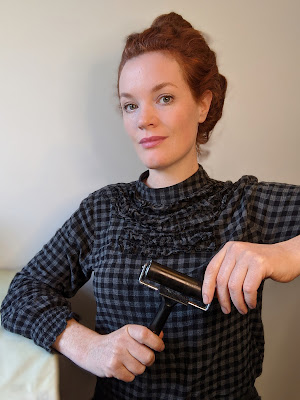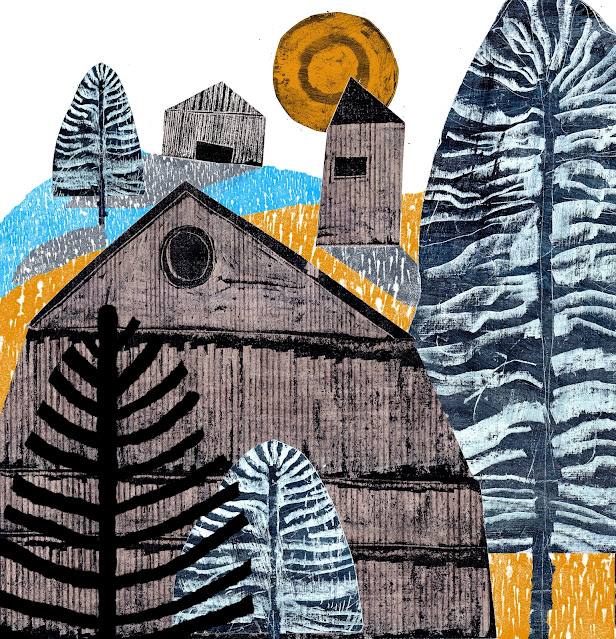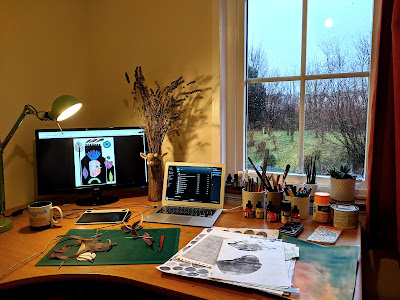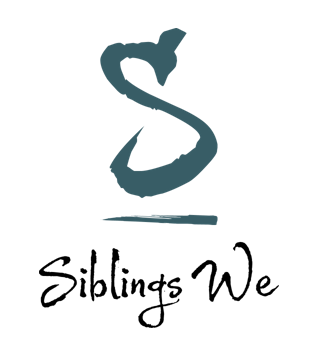
Name: Astrid Jaekel
Lots of textures, bold silhouettes and shapes, analogue meets digital.
What items are an essential part of your creative space?
Ink, rollers, watercolour, brushes, craft knife, scanner, laptop and Wacom tablet
But also: music, audio books & daily soaps, barley coffee, very dark chocolate and a massage pad for my achy illustrator’s back
Do you have a favourite artistic medium?
I love working with stamp printing and mixed media collage. I create my own coloured and textured papers and then cut them up and scan so I can arrange all the bits digitally. I love to working with materials and want to retain an analogue aesthetic while allowing myself the freedom of combining and moving things around endlessly on screen.
Not long ago I visited the Hans Christian Andersen Museum in Odense, Denmark. I’m impressed with how he made all those tiny paper cut-outs using a massive pair of scissors, and that while he was telling stories to an audience. I take inspiration from a broad range of things, often unrelated to illustration. I’ve been spending some time looking at Max Ernst’s rubbings and grattages lately, and also love looking at 18 century silhouette paintings and folk art in general.
It would be exciting to see the Berlin of the 1920s and experience the artistic scene back then. I’d love to visit a Dada performance and soak up some of that crazy energy
Who or what inspired you to become an illustrator?
I spent a large part of my childhood living in Ireland, where my parents had moved to from Germany to live an adventurous life, running an almost self-sufficient farm. I had the sort of childhood that many kids in the 80s would have had: very little entertainment, no sports clubs or music classes to be taken to, and just lots of time on my hands. My three siblings and I were usually sent out to play and would only return home for lunch or dinner. We mostly just roamed freely on the farm.
It still took me a while to realise that I could be doing illustration professionally. It wasn’t an option anybody told you about at school and I wasn’t aware of many creative professions. After school, I applied for a design course in Germany, but my portfolio was rejected. I was gutted, believing I had no talent.
My studio is a small room within our house. Before we moved into it this year my studio was in the corner of our flat’s living room in-between my little daughter’s toys and all sorts of stuff. Now I finally have a place of my own and I love taking a moment to look at all my books lined up in the shelf and knowing exactly where to find everything in lots of drawers and boxes. Nothing like your own space! The state of my studio usually reflects the state of my mind and goes from orderly, fresh and focussed to very chaotic if I’m nearing a deadline and have been losing sleep / my nerves!
What is your favourite part of the illustration process?
I love the doodling stage when I come up with all sorts of ideas. This often happens while I’m sitting on the train on the way back home from my teaching job in town. As my commute only takes 24 minutes there’s some pressure to think quickly and that is really good for me as I otherwise tend to faff about! Once at home it’s harder to find a really peaceful moment to concentrate. And then of course I love getting lost in the mindless making stage while listening to a good audiobook.
What advice would you give to an aspiring illustrator?
I think it’s important to not try to be somebody else but to be yourself within your work as much as you can. Take inspiration from what your truly passionate about feed that energy into our work. Illustration fashions come and go. I personally think it’s more rewarding to find some of your inspiration outside of illustration instead of just looking at other illustrators. Within my career it has also been really helpful to reach out to people and prospective clients in real life and not just over social media. Join up with pals to get an exhibition going, meet like-minded people. Illustration can be a lonely place and it’s great to have a community that exists outside of your phone!
Astrid has lived for most of her life in West Cork, Ireland, and Frankfurt, Germany. She now is based just outside of Edinburgh, Scotland, where she works as both a freelance Illustrator and teaches illustration at Edinburgh College of Art. As an artist, Astrid likes working with anything from the tiniest design to huge public installations.
For more information, please visit Astrid’s website or follow her on instagram.
February 10, 2022 at 12:35AM Katrin Dreiling







